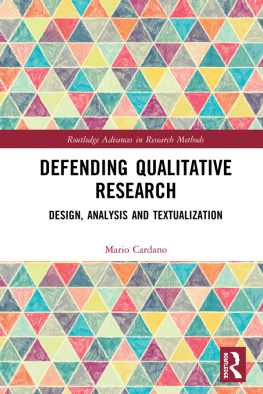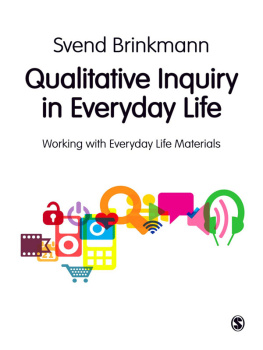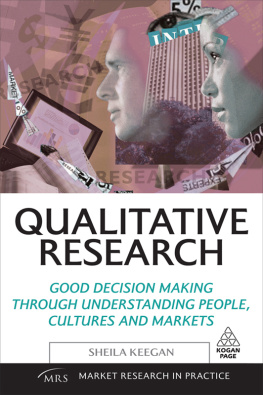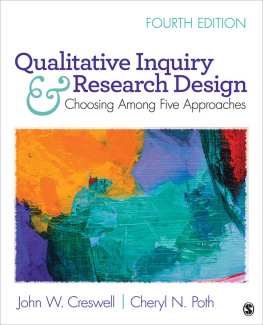SAGE Publications Ltd
1 Olivers Yard
55 City Road
London EC1Y 1SP
SAGE Publications Inc.
2455 Teller Road
Thousand Oaks, California 91320
SAGE Publications India Pvt Ltd
B 1/I 1 Mohan Cooperative Industrial Area
Mathura Road
New Delhi 110 044
SAGE Publications Asia-Pacific Pte Ltd
3 Church Street
#10-04 Samsung Hub
Singapore 049483
Lynn Butler-Kisber 2018
First published 2010
Apart from any fair dealing for the purposes of research or private study, or criticism or review, as permitted under the Copyright, Designs and Patents Act, 1988, this publication may be reproduced, stored or transmitted in any form, or by any means, only with the prior permission in writing of the publishers, or in the case of reprographic reproduction, in accordance with the terms of licences issued by the Copyright Licensing Agency. Enquiries concerning reproduction outside those terms should be sent to the publishers.
Library of Congress Control Number: 2017955082
British Library Cataloguing in Publication data
A catalogue record for this book is available from the British Library
ISBN 978-1-4739-6690-1
ISBN 978-1-4739-6691-8 (pbk)
Editor: Mila Steele
Assistant editor: John Nightingale
Production editor: Victoria Nicholas
Copyeditor: Jill Birch
Proofreader: Elaine Leek
Marketing manager: Susheel Gokarakonda
Cover design: Bhairvi Gudka
Typeset by C&M Digitals (P) Ltd, Chennai, India
Printed in the UK
Introduction
This book is intended for graduate students at all stages in the qualitative inquiry process, and other researchers who are in search of ways to match the best possible perspectives and approaches to their research focus and questions. It will be helpful for professors involved in graduate supervision, as well as for other researchers in the field.
The content of the book emerged from my own research and graduate supervision and was shaped more specifically from my 20 years of teaching qualitative inquiry courses to graduate students in the Faculty of Education at McGill University. For 15 years I have been teaching a course entitled Interpretive Inquiry, which over the years has included a rich cross-section of students from dietetics, education, epidemiology, geography, law, nursing, physical and occupational therapy, and social work. It is a course that I proposed and developed because of a need expressed repeatedly by graduate students for a broader exposure to a variety of inquiry approaches and perspectives, and a more in-depth look at how to implement them.
The chapters which follow should help researchers from different disciplines to choose and match their inquiry approaches with their research questions, beliefs and assumptions, communicative abilities and passions (Patton, 2002), and defend the work they are doing. While a good number, but not all, of the examples contained in the chapters are drawn from my experiences with graduate students who are from education, the processes involved have been used effectively by researchers/graduate students in other areas (for example in criminology, epidemiology, geography, law, and social work) and I believe have currency regardless of the discipline.
Doing, reading and writing qualitative research are part of the same complex science and art. Each is an act of inquiry that aims at making meaning of the world. Although people often perceive these dimensions as discrete and disconnected, these three acts are interrelated and require many of the same skills, approaches, and attitudes. In each, we construct meanings, understandings, and interpretations about others behaviors or interpretations of events. (Brizuela, Stewart, Carrillo, & Berger, 2000, p. xi)
This book focuses on various approaches to inquiry and at the same time grounds these in the appropriate perspective(s) so that a researcher can argue convincingly for the approach taken, and explain clearly, rigorously, and convincingly how this has been done. It attempts to move away from the dichotomy that separates methods from the overall inquiry process, and to show the overlap and complexities that exist when trying to situate a study within a particular perspective. It provides the theoretical underpinnings that guide the various forms of inquiry including the newer, burgeoning arts-based approaches in qualitative work, and discusses some of the salient issues such as ethics, challenges, representation, and assessment criteria, and suggests strategies for addressing them. However, the main thrust of the book is to examine carefully a range of inquiry approaches, from the older, more traditional thematic approaches to the many and varied artful inquiry approaches that are helping to push the boundaries of research. It provides an overview that shows rather than just tells what is available for conducting the work. This book demonstrates how to choose these approaches appropriately and, most importantly, explains with examples how to rationalize and carry out the processes.
A reasonable question that should be addressed when writing the second edition of a book is, what has been changed. I will briefly outline the changes that have been made to update the work and to respond to helpful suggestions that were made when the 2010 edition was reviewed before work on the second edition commenced.
- The term arts-informed has been changed to arts-based to respond to the more universal use of the latter (explained more fully in ).
- A discussion on Indigenous epistemology has been introduced in to balance the Western gaze (Kovach, 2018) on which, consciously or unconsciously, much qualitative research has been based.
- The chapters have been organized into sections. provides some concluding remarks about issues in and future directions for qualitative inquiry.
- Examples of inquiry processes have been updated, and an attempt has been made to find relevant work from different disciplines and geographical places.
- Further readings are suggested and have been added at the end of each chapter.
- References from each chapter are merged and found at the end of the book.
- There have been some cosmetic changes as well that I hope will make the reading more user-friendly.












